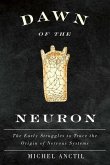This book explores how and when biology emerged as a science in Germany. Beginning with the debate about organism between Georg Ernst Stahl and Gottfried Leibniz at the start of the eighteenth century, John Zammito traces the development of a new research program, culminating in 1800, in the formulation of developmental morphology. He shows how over the course of the century, naturalists undertook to transform some domains of natural history into a distinct branch of natural philosophy, which attempted not only to describe but to explain the natural world and became, ultimately, the science of biology.
Hinweis: Dieser Artikel kann nur an eine deutsche Lieferadresse ausgeliefert werden.
Hinweis: Dieser Artikel kann nur an eine deutsche Lieferadresse ausgeliefert werden.








